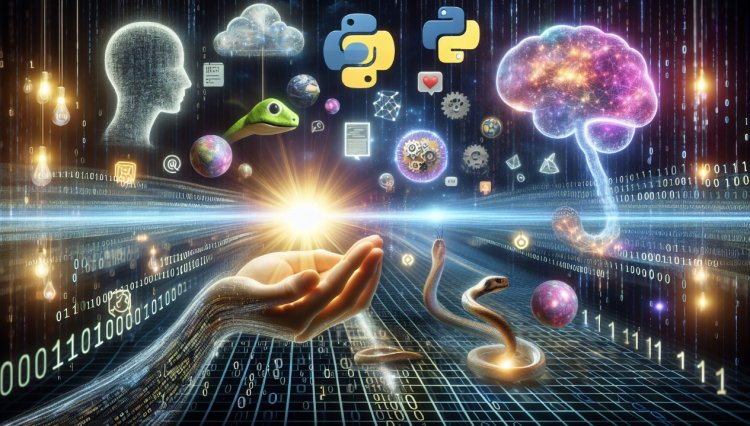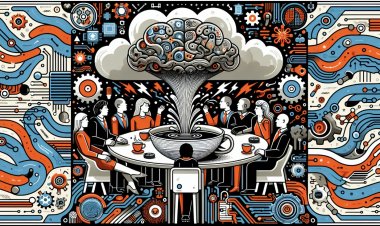The Rise of Generative AI: Exploring OpenAI's Chat GPT
Dive into the fascinating world of generative AI with OpenAI's Chat GPT! Explore its capabilities, applications, and impact on communication, creativity, and the future of technology. Unleash the power of words and discover the potential of this revolutionary technology.

Introduction
Generative AI is a revolutionary technology that has gained significant attention in recent years. It involves the creation of artificial intelligence systems that can generate new content rather than simply analyzing or acting on existing data. One prominent player in the field of generative AI is OpenAI, a research organization focused on advancing digital intelligence for the benefit of humanity.
OpenAI has made waves with its latest product, Chat GPT. This cutting-edge technology has gained immense popularity, amassing over a million users in just five days after its launch on November 30, 2022. But what exactly is Chat GPT, and how does it work?
OpenAI created Chat GPT, an AI system that enables conversational interactions. Unlike previous attempts at AI chatbots, such as Microsoft's Tay and Meta's Blenderbot 3, Chat GPT has implemented measures to avoid offensive or harmful outputs. OpenAI has employed a moderation API to assist developers in upholding content policies and ensuring the system's ethical use.
Chat GPT builds upon the foundation of OpenAI's earlier natural language system, GPT-3. By utilizing an upgraded version of GPT-3, Chat GPT can generate text at remarkable speeds and exhibit seemingly natural dialogue. It can answer follow-up questions, admit mistakes, challenge incorrect premises, and reject inappropriate requests, making it an impressive conversational language system.
The versatility of Chat GPT is astounding. It can correct grammar, summarise complex text into simple concepts, convert movies into emojis, and even fix bugs in Python code. OpenAI's goal with Chat GPT is to provide users with a genuinely useful and lifelike chatbot experience.
Understanding how generative AI works and its potential impact is crucial in this rapidly evolving technological landscape. As we delve deeper into the world of generative AI, we will explore the capabilities and limitations of Chat GPT, as well as the ethical implications and societal challenges it presents.
Understanding Generative AI and Open AI
Generative AI is a revolutionary technology that involves the creation of artificial intelligence systems capable of generating new content, as opposed to simply analysing or acting on existing data. OpenAI is a prominent player in the field of generative AI, a research organisation focused on advancing digital intelligence for the benefit of humanity.
OpenAI, founded in 2015 by Sam Altman and Elon Musk, aims to advance digital intelligence in a way that benefits humanity. Although Musk stepped down in 2018 to focus on Tesla, he remains a donor and advisor to the business. Initially, a non-profit organisation, OpenAI has now shifted to a capped-profit model.
OpenAI's latest product, Chat GPT, has gained immense popularity since its launch on November 30, 2022, amassing over a million users in just five days. Chat GPT is an AI system developed by OpenAI that enables conversational interactions. It builds upon the foundation of OpenAI's earlier natural language system, GPT-3, utilising an upgraded version to generate text at remarkable speeds and exhibits seemingly natural dialogue.
One of OpenAI's previous projects, Dali, is text-to-image AI software that creates photorealistic images based on simple written inputs. Dali 2, the latest version of this AI system, takes text descriptions and turns them into images that have never existed before. OpenAI's goal is to push the boundaries of digital intelligence and unlock its potential for various applications.
The main objective of OpenAI is to advance digital intelligence and ensure that it is developed and used responsibly. With Chat GPT, OpenAI has implemented a moderation API to assist developers in upholding content policies and ensuring ethical use of the system. Although it is not perfect, the moderation system helps flag and prevent the dissemination of illegal or unsafe information.
Chat GPT's capabilities are vast and versatile. It can correct grammar, summarise complex text into simple concepts, convert movies into emojis, and fix bugs in Python code. OpenAI's aim with Chat GPT is to provide users with a genuinely useful and lifelike chatbot experience.
As generative AI continues to evolve, it is important to understand its potential impact and the challenges it presents. OpenAI's Chat GPT is just one example of how generative AI can revolutionise conversational interactions and enhance various tasks. However, it is crucial to address the ethical implications, limitations, and societal challenges associated with the development and use of generative AI technologies.
Introducing Chat GPT
OpenAI created Chat GPT, an AI system that enables conversational interactions. It is a revolutionary technology in the field of generative AI, capable of generating new content and engaging in seemingly natural dialogue.
Unlike previous AI chatbots such as Microsoft's Tay and Meta's Blenderbot 3, Chat GPT has implemented measures to avoid offensive or harmful outputs. OpenAI has employed a moderation API to assist developers in upholding content policies and ensuring the system's ethical use.
Chat GPT builds upon the foundation of OpenAI's earlier natural language system, GPT-3. By utilising an upgraded version of GPT-3, Chat GPT can generate text at remarkable speeds and exhibit conversational capabilities that mimic human interaction. It can answer follow-up questions, admit mistakes, challenge incorrect premises, and reject inappropriate requests, making it an impressive conversational language system.
The features and functionalities of Chat GPT are vast. It can correct grammar, summarise complex text into simple concepts, convert movies into emojis, and even fix bugs in Python code. This versatility makes Chat GPT a powerful tool in various application areas.
Chat GPT finds applications in several areas, including customer support, content generation, language translation, and educational assistance. Its ability to engage in natural conversations and provide accurate responses makes it a valuable asset for businesses and individuals seeking efficient and lifelike chatbot experiences.
When comparing Chat GPT to previous AI chatbots like Tay and Blenderbot 3, it is evident that OpenAI has made significant advancements in ensuring a safe and reliable conversational AI system. OpenAI's moderation system ensures more responsible use of the technology by preventing the dissemination of unlawful or unsafe information.
Development and training of Chat GPT
Since its release on November 30, 2022, Chat GPT, a ground-breaking AI system by OpenAI, has experienced tremendous growth in popularity. But how exactly was Chat GPT developed and trained?
The training process of Chat GPT involves utilising AI and machine learning techniques to generate text at remarkable speeds and exhibit seemingly natural dialogue. OpenAI has trained Chat GPT with massive amounts of text data from various sources, allowing it to understand and respond to a wide range of conversational inputs.
One key aspect of Chat GPT's training process is the use of reinforcement learning from human feedback (RLHF). This means that human AI trainers provide feedback on model-generated responses, helping the system understand and improve its outputs over time. By iteratively refining the model through RLHF, OpenAI aims to create a chatbot that can answer follow-up questions, admit mistakes, challenge incorrect premises, and reject inappropriate requests, providing users with a more lifelike and valuable conversational experience.
However, it is important to note that Chat GPT's knowledge base is limited, mostly linked to the year 2021. As a result, the system may struggle to answer questions related to recent events or developments. OpenAI acknowledges this limitation and is continually working to expand and update the knowledge base of Chat GPT with more recent information to enhance its usability and relevance.
Interestingly, Elon Musk, a donor and advisor to OpenAI, has paused access to Twitter's database for training Chat GPT. This decision was made because OpenAI is no longer a non-profit organisation and believes that it should pay for access to information in the future. This pause highlights the importance of responsible data usage and the need to ensure ethical practices in the development and training of AI systems.
Despite these limitations and challenges, Chat GPT represents a significant advancement in generative AI technology. Its ability to correct grammar, summarise complex text, convert movies into emojis, and fix bugs in Python code showcases its versatility and usefulness in various application areas.
Ethical Implications of Chat GPT
With the overwhelming demand for Chat GPT, it is evident that generative AI has captured the attention and curiosity of millions of users. However, as this technology continues to evolve, it is important to consider the ethical implications it brings.
Limitations and Challenges of Technology
While Chat GPT showcases impressive capabilities, it also has its limitations and challenges. One limitation is its knowledge base, which is mostly linked to 2021. This means that the system may struggle to answer questions related to recent events or developments. OpenAI acknowledges this limitation and is actively working to update and expand the knowledge base to enhance the system's usability and relevance.
Ethical Concerns Related to Code Writing and Academic Dishonesty
Chat GPT's ability to generate human-like written text has raised concerns about code writing and academic dishonesty. Some individuals have used the system to write their code or answer exam questions, which raises ethical questions about academic integrity. Educational institutions must address these concerns and develop strategies to detect and prevent the misuse of generative AI technologies in academic settings.
Exploration of Potential Threats to User Privacy
Generative AI systems like Chat GPT raise concerns about user privacy. As users interact with the system and provide personal information or engage in sensitive conversations, there is a potential risk of data misuse or unauthorised access. Developers and organisations need to prioritise user privacy and implement robust security measures to protect user data from potential threats.
Impact of Generative AI on Employment and Industries
Generative AI technologies, including Chat GPT, have the potential to disrupt industries and impact employment. As AI systems become more advanced and capable, there is a concern that they could replace human workers in certain roles. For example, the rise of Dali 2, the text-to-image AI software, has raised concerns among photographers who now find themselves competing with AI-generated images on platforms like Shutterstock. Society needs to navigate these changes and find ways to adapt to the evolving job market.
Overall, the development and use of generative AI technologies like Chat GPT present both opportunities and challenges. It is crucial for developers, users, and policymakers to critically evaluate the ethical implications and societal impact of these technologies to ensure responsible and beneficial use in the future.
Positives and Negatives of Chat GPT
The ground-breaking AI system that OpenAI created, Chat GPT, raises several issues and offers many advantages. Let's explore the positives and negatives of Chat GPT:
Benefits of Chat GPT for business owners and customer service
Chat GPT provides business owners with a valuable tool for customer service. It can assist with live chat queries by providing quick and natural responses, helping to improve customer satisfaction and increase sales. The ability of Chat GPT to engage in lifelike conversations makes it a valuable asset in enhancing customer interactions.
Acknowledgment of incorrect or misleading answers
While Chat GPT is an impressive conversational language system, it is essential to acknowledge that it may provide incorrect or misleading answers. OpenAI has already recognised this limitation, as the data used to train the model lacks a source of truth. Users should exercise critical thinking and fact-check information obtained from Chat GPT.
In comparison to traditional search engines like Google
Chat GPT offers an alternative to traditional search engines like Google. Instead of scrolling through ads and search results, users can ask questions and receive accurate answers directly from Chat GPT. This streamlined approach to information retrieval may save time and provide more efficient access to knowledge.
Consideration of future monetization models
As Chat GPT continues to evolve, OpenAI may explore various monetization models. While the Q&A functionality of Chat GPT is currently free to the public, future iterations could include cost-per-question, advertisements, or microtransactions. The introduction of monetization models may help sustain the development and improvement of Chat GPT.
Balancing the potential for unemployment with useful applications
Generative AI technologies like Chat GPT have the potential to disrupt industries and impact employment. As AI systems become more advanced, there is a concern that they could replace human workers in certain roles. However, it is important to recognise that Chat GPT also offers useful applications, such as customer service support and language translation. Society must find a balance to navigate these changes and ensure the responsible use of generative AI technologies.
It is crucial to consider both the benefits and potential challenges associated with Chat GPT and other generative AI technologies. While Chat GPT provides valuable functionalities for businesses and individuals, it is essential to approach its output with critical thinking and verify information when necessary. As this technology continues to evolve, it is important for developers, users, and policymakers to actively address the ethical implications, limitations, and societal impact to ensure responsible and beneficial use in the future.
The Future of Generative AI
Generative AI has already made a significant impact in various industries, and its potential for the future is even more exciting. As we look ahead, there are several key points to consider when discussing the future of generative AI.
Discussion on the future impact of generative AI
Generative AI has already proven to be a game-changer in fields like customer support, content generation, language translation, and educational assistance. As technology continues to evolve, we can expect it to have an even greater impact, transforming the way we interact with the internet and perform various tasks.
Speculation on potential outcomes and changes
Generative AI has the potential to revolutionise industries and streamline processes. In the future, we may see further advancements in natural language processing, allowing AI systems to engage in even more lifelike and meaningful conversations. Additionally, as technology becomes more prevalent, we may see changes in employment patterns and job roles, requiring individuals and industries to adapt to the evolving landscape.
Comparisons to Google and the iPhone
Just as Google revolutionised the way we search for information and the iPhone transformed the way we communicate, generative AI has the potential to become an integral part of our daily lives. Some believe that generative AI could eventually replace traditional search engines, providing users with accurate answers and information in a more efficient manner. However, it is important to recognise that generative AI and search engines serve different purposes, and both will likely coexist in the future.
Exploration of societal adaptation to technology
As with any new technology, there will be a period of societal adaptation to generative AI. Individuals, businesses, and policymakers must understand the ethical implications, limitations, and challenges associated with generative AI. This includes addressing concerns such as user privacy, misinformation, and the impact on employment. By proactively addressing these issues, we can ensure the responsible and beneficial use of generative AI.
OpenAI's ongoing efforts to improve and understand the technology
OpenAI, as a leading organisation in the field of generative AI, is committed to continuously improving and understanding the technology. They are actively working to address limitations, refine models, and enhance the ethical use of generative AI. OpenAI's efforts, along with the contributions of researchers and developers around the world, will shape the future of generative AI and ensure its responsible integration into society.
In conclusion, the future of generative AI holds immense promise and potential. As technology continues to evolve, we can expect to see further advancements, changes in industries and employment patterns, and societal adaptation. By understanding the impact and challenges of generative AI and actively working to address them, we can maximise the benefits of this revolutionary technology.



 admin
admin 










